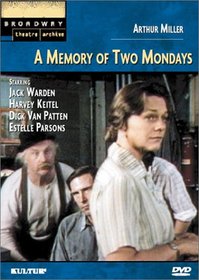| Actors: Donald Buka, Catherine Burns, J.D. Cannon, George Grizzard, Dan Hamilton Director: Paul Bogart Creators: Saul Landa, Jacqueline Babbin, Arthur Miller Genres: Comedy, Drama, Television, Musicals & Performing Arts Sub-Genres: Comedy, Drama, Television, Broadway Theatre Archive Studio: Kultur Video Format: DVD - Color DVD Release Date: 07/30/2002 Original Release Date: 04/03/1974 Theatrical Release Date: 04/03/1974 Release Year: 2002 Run Time: 1hr 28min Screens: Color Number of Discs: 1 SwapaDVD Credits: 1 Total Copies: 0 Members Wishing: 2 MPAA Rating: NR (Not Rated) Languages: English |
Search - A Memory of Two Mondays (Broadway Theatre Archive) on DVD
  | A Memory of Two Mondays Broadway Theatre Archive Actors: Donald Buka, Catherine Burns, J.D. Cannon, George Grizzard, Dan Hamilton Director: Paul Bogart Genres: Comedy, Drama, Television, Musicals & Performing Arts NR 2002 1hr 28min Dramatizing a compacted group of memories passing over several years, Arthur Miller's vivid comedy-drama portrays the nature of life during America's Great Depression. The emphasis is on mood and characterization as Miller... more » |
Larger Image |
Movie DetailsSimilar Movies
|
Movie Reviews"There's something so terrible here...no end ever...just no Mary Whipple | New England | 08/29/2005 (5 out of 5 stars) "Set in summer, 1933, in the depths of the Depression, Arthur Miller's most personal and intimate play focuses on the workers in a warehouse, a grim place in which men and women work for small wages and are grateful for the work. Appearing at the beginning of this production to set the scene, Miller observes that the Civil War and the Depression were the only times in American history in which the whole country was in the same boat-"You could not do a single thing that you wanted to do because no one had any money." The warehouse, he notes, became a grotesque sort of haven for the employees since they, at least, had jobs. Miller's own experience in a warehouse shows in his exceptionally realistic portrayal of the workers, men who often lose themselves in alcohol to escape reality, and women who must put up with sexual abuse and mistreatment to save their jobs.
Focusing primarily character, rather than plot, this intimate, made-for-TV production (1970) features a stellar cast of characters whose dreams have been deferred or destroyed: Bert (Kristoffer Tabori), a young boy who dreams of college; Kenny (Dan Hamilton), a young Irish immigrant with a song on his lips, poetry in his heart, and a yearning to see the sun through the begrimed windows; Raymond (Dick Van Patten), the sympathetic manager, who must ensure that the work gets done; Tommy Kelley (J. D. Cannon), an alcoholic accountant who becomes almost catatonic with drink, then is "saved"; Gus (Jack Warden), another drunk, called "King Kong" by the women in the office; Agnes (Estelle Parsons), a kind hearted receptionist who bursts into tears at the sadness of the lives around her. An equally talented subordinate cast, including Jerry Stiller as a mechanic, provides an exceptionally broad view of life. As the characters reveal their inner lives within the warehouse, their emotional depressions become even more obvious than the economic Depression. When Gus, who has just lost his wife, suddenly enters wearing a new coat and fancy suit, after cashing in his life insurance policy, the scene is set for his confrontation with the boss and the eventual climax. The casting is superb, the acting is outstanding, and the dramatic action, all taking place in a dreary warehouse room, reveals both the camaraderie and the tension resulting from the enforced intimacy of characters who are not always compatible. Directed by Paul Bogart, this play shows Miller looking at everyday Depression life through a microscope, a dramatic change of focus from the broader, more universal themes which usually dominate his plays. Inspired by Miller's own life, this play speaks to the heart. Mary Whipple " |






